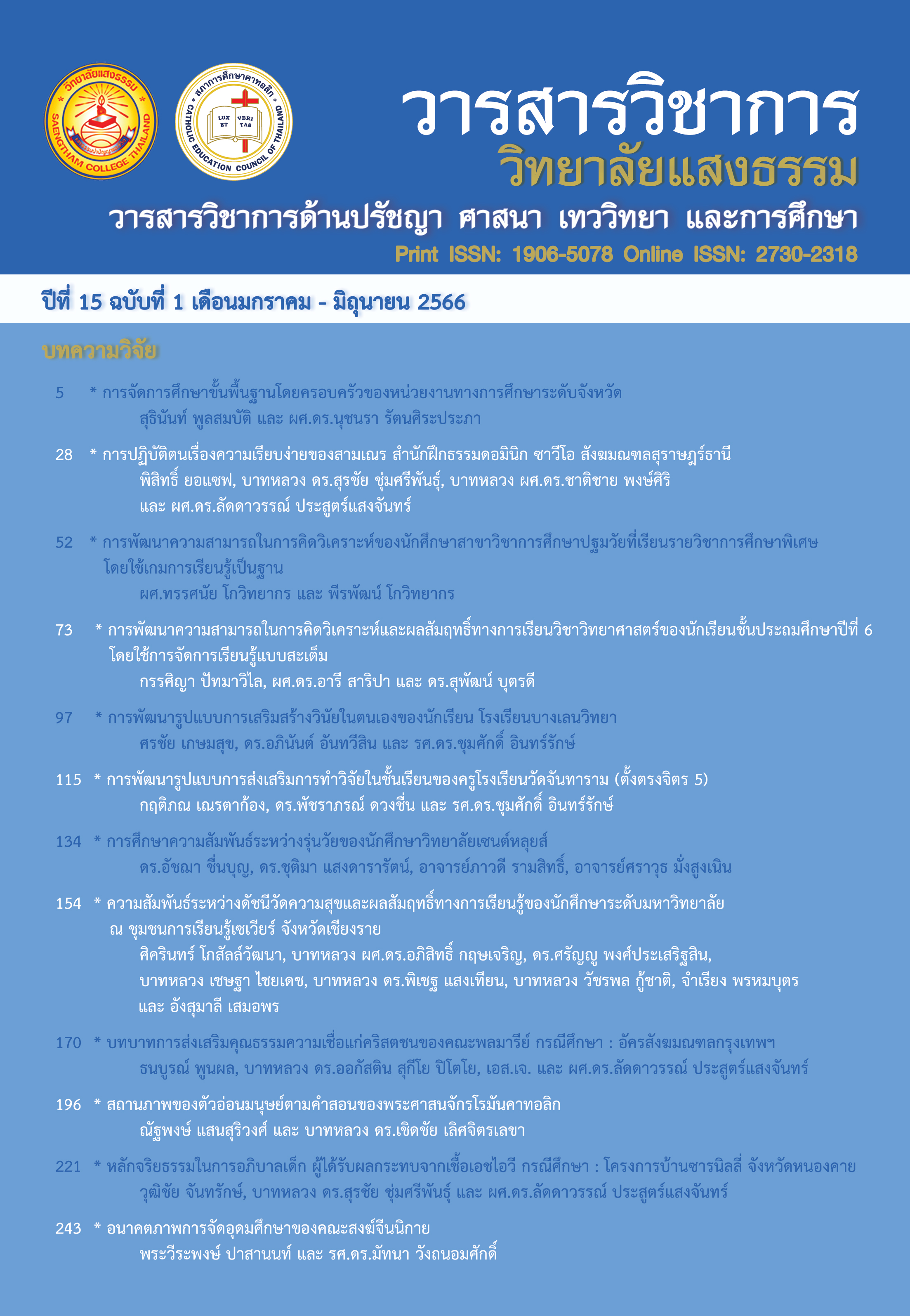The Development Of Critical Thinking Ability And Learning Achievement In Science For The Sixth Grade Students By Using Stem Instruction
Main Article Content
Abstract
The purposes of this research were 1) to compare pretest and posttest scores of critical thinking ability of sixth grade students, and posttest scores with an average score criterion of 70% after learning through STEM instruction, 2) to compare pretest and posttest scores of learning achievement in Science of sixth grade students, and the posttest scores with an average score criterion of 80% after learning through STEM instruction, and 3) to study students’ satisfaction towards learning Science by STEM instruction. The research was an experimental design. The samples consisted of 46 sixth grade students from a municipality school in Nakhon Si Thammarat in the second semester of academic year 2020. The research instruments were 1) STEM based lesson plans, 2) critical thinking abilities test, 3) science achievement test, and 4) satisfaction evaluation questionnaires. The data were analyzed by the statistics of percentage, mean, standard deviation and t-test; dependent samples and one sample t-tests were utilized for hypothesis testing.
The research results revealed that 1) the posttest scores of critical thinking ability of sixth grade students after taught by STEM instruction were higher than the pretest and the average score criterion of 70% at the .05 level of significance. 2) The posttest scores of learning achievement in Science of sixth grade students after taught by STEM instruction were higher than the pretest and the average score criterion of 80% at the .05 level of significance. Also, 3) Students’ satisfactions towards learning Science by the STEM instruction approach were at the highest level.
Article Details

This work is licensed under a Creative Commons Attribution-NonCommercial-NoDerivatives 4.0 International License.
- The academic and research articles, as well as the content and opinions expressed therein, published in Saengtham College Journal are solely the responsibility of the respective author(s).
- Articles published in Saengtham College Journal are the property of Saengtham College. Reproduction, modification, or dissemination of all or part of the content in any form without written permission from Saengtham College is prohibited.
- Articles published in Saengtham College Journal are protected under the Copyright Act.
References
กลิ่น สระทองเนียม. (2556). บ้านนักวิทยาศาสตร์น้อย ปูรากฐานเด็กไทยสู่อนาคต. http://www.dailynews.co.th/Content.do?contentId= 50718.
ณัฏชยานันต์ เกตุศรีศักดา และคณะ. (2560). ผลสัมฤทธิ์ทางการเรียนและทักษะกระบวนการทางวิทยาศาสตร์ของนักเรียนชั้นประถมศึกษาปีที่ 5 ที่ได้รับการจัดการเรียนรู้แบบสะเต็มศึกษา. การประชุมวิชาการระดับชาติ “นอร์ทเทิร์นวิจัย” ครั้งที่ 3 ประจำปี 2559.
ดวงจันทร์ วรคามิน และคณะ. (2559). การศึกษาความสามารถด้านการคิดวิเคราะห์และการมีจิตสาธารณะเพื่อพัฒนาศักยภาพการเป็นคนดีคนเก่งของนักเรียนไทย. www.knowledgefarm.in.th/from-pisa-to-thai-education-crisis/
นูรอาซีกีน สาและ, ณัฐินี โมพันธุ์ และมัฮดี แวดราแมคู. (2560). ผลของการจัดการเรียนรู้ตามแนวคิดสะเต็มศึกษาที่มีต่อผลสัมฤทธิ์ทางการเรียนวิชาเคมี ความสามารถในการคิดวิเคราะห์ และความพึงพอใจต่อการจัดการเรียนรู้ ของนักเรียนชั้นมัธยมศึกษาปีที่ 4. คณะศึกษาศาสตร์ มหาวิทยาลัยสงขลานครินทร์.
พัทธมน นามปวน, นันทรัตน์ เครืออินทร์ และฉัตรชัย เครืออินทร์. (2557). การศึกษารูปแบบการจัดกิจกรรมการเรียนรู้วิชาวิทยาศาสตร์ เรื่องวัสดุและสมบัติของวัสดุแบบสะเต็มศึกษา (STEM education) ของนักเรียนชั้นประถมศึกษาปีที่ 5. คณะศึกษาศาสตร์ มหาวิทยาลัยสงขลานครินทร์.
ล้วน สายยศ และอังคณา สายยศ. (2543). เทคนิคการวัดผลการเรียนรู้. สุวีริยาสาส์น.
วโรดม จันที. (2553). การศึกษาการคิดวิเคราะห์และผลสัมฤทธิ์ทางการเรียน เรื่องสารในชีวิตประจำวันของนักเรียนชั้นประถมศึกษาปีที่ 6 โดยใช้รูปแบบการจัดการเรียนรู้แบบคอนสตรัคติวิสต์ของ Yager. มหาวิทยาลัยขอนแก่น.
วิจารณ์ พานิช. (2555). วิถีสร้างการเรียนรู้เพื่อศิษย์ในศตวรรษที่ ๒๑. มูลนิธิสดศรี.
สำนักวิชาการและมาตรฐานการศึกษา. (2560). แนวทางการนำมาตรฐานการศึกษาขั้นพื้นฐานสู่การปฏิบัติ. กรุงเทพฯ: โรงพิมพ์ชุมนุมสหกรณ์การเกษตรแห่งประเทศไทย.
สำนักวิชาการและมาตรฐานการศึกษา. (2560). ตัวชี้วัดและสาระการเรียนรู้ ตามหลักสูตรแกนกลางการศึกษาขั้นพื้นฐาน พุทธศักราช 2551. โรงพิมพ์ชุมนุมสหกรณ์การเกษตรแห่งประเทศไทย.
สิรินภา กิจเกื้อกูล. (2558). สะเต็มศึกษา (STEM EDUCATION). วารสารศึกษาศาสตร์ มหาวิทยาลัยนเรศวร, 201-202(1).
สุธีระ ประเสริฐสรรพ์. (2558). สะเต็มศึกษา : ความท้าทายใหม่ของการศึกษาไทย. นำศิลป์โฆษณา
โสภา มั่นเรือง และจรินทร อุ่มไกร. (2559). A Development of Science Subject to Conquer Achievement of Grade 5 Students by Using STEM Education Case Study of Suphannapoom School. การประชุมวิชาการระดับชาติ การจัดการเทคโนโลยีและนวัตกรรม ครั้งที่ 2. คณะเทคโนโลยีสารสนเทศ มหาวิทยาลัยราชภัฏมหาสารคาม.
Likert, Rensis A. (1961). New Patterns of Management. McGraw-Hill Book Company Inc.


